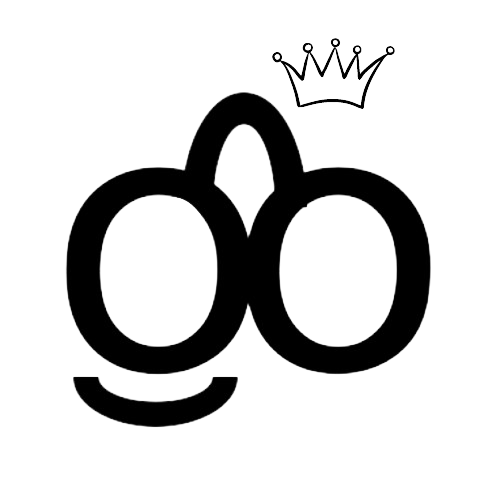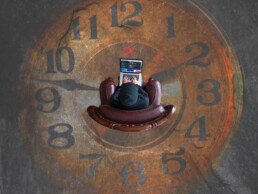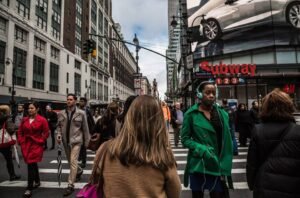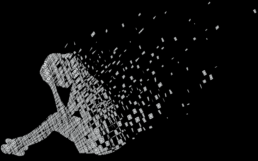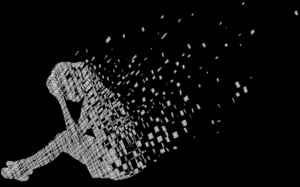The Incubator Experience: Pregnancy
Pregnancy.
Wherever your affiliation lies - creation or evolution, everybody agrees that pregnancy is central to the peopling of the world, and the advancement of our race as a sentient being. From time immemorial, we have studied it, sought to understand its stages, its object and implication.
It is the 9-month incubator experience that forms the bones, elements, features and traits of human beings. The biological state by which a woman carries her young until they are ready to be born. The bulge in a woman's stomach area signifying new life and an explosion of joy.
Animals carry their young too. But for different durations. Elephants are pregnant for 22 months. Some sharks can be pregnant for 3-and-a-half years.
Men carry pregnancies too. Just not of human young, but of ideas, dreams and aspirations. And women can be pregnant with more than human young. Whether carrying pregnancies for days, weeks, months or years, everybody hopes to someday birth the manifestation of their biggest dreams.
Are you the 'young' in life's womb?
If so, are you ready to face the world?
Conversely, are you pregnant with dreams?
Are they ready for the world?
Timing is crucial.
Have a safe birth to your pregnancy.
Read Eccle. 11.5
Read some more of my writing here.
Great ideas start out looking silly.

Great ideas start out looking silly.
And so do their proponents.
For as long as the flood existed only in Noah's mind, he looked stupid. While he chiseled, hammered, nailed things into place, it appeared like he was high on something.
Absurdity has some affiliation with greatness. Great people don't pursue commonplace things. Great events defy the normal, usurp the ordinary, challenge the natural.
And while you build by day,
And preach an impending change by night,
You look foolish...
...until the first raindrop.
Prov. 22.29
You can find some more of my writing here.
Disqualified by credentials
Disqualified by credentials.
Lacking in some respect.
Not good enough.
Short by a few inches.
Ever applied to a job vacancy even though your qualifications were clearly insufficient? We all have. If the economic implication of unemployment isn't traumatic enough, placing stringent conditions [experience, minimum degree, grade, gender, location] worsens things.
Thankfully, God doesn't treat us the same.
All He generously offers, everybody can obtain.
No one is disqualified from applying.
Forget "deep" concepts of salvation, faith, repentance, forgiveness, holiness and speaking in tongues.
Think about rain, sunshine, love, joy, nature, the oceans, water, air and the splendour of new birth. All freely given.
Disqualified by credentials.
Saved by Grace.
Read some more of my writing here.
Who did Jesus come for?
Contrary to belief, or sentimental unfounded 'truths', Jesus didn't come for Christians. He came for the world - the entire present 7billion+ of us, the millions of departed souls, and a thousand future generations. The amazing underlying concept of the Christian faith is the depth and height of God's love. It goes to the lowest lows, and reaches the heighest heights.
Jesus came for the world. He looked down longingly with love at a lost world, going after its own lusts, trying rather hard, yet getting nowhere.
And interestingly, whenever the word 'world' is used, it represents a wide array of lumped-together elements. Not just the good, but the bad, the ugly, the detestable, the destructive. Not just the pleasant, but the unpleasant.
Bible hugging, Scripture rapping, cross flaunting...don't cut it. Jesus didn't die just for the churchy and spiritual, the law-abiding, and the moral loyalists. If you could glance quickly at His 'To Save' list, you would find rapists, thugs, wife-beaters, commercial sex workers, cultists, thieving politicians, arrogant businessmen, terrorists, child molesters, and the common sinner.
He came for a world of Muslims, Buddhists, Judaists, Hindus, atheists, agnostics...and well, of course, Christians.
Your name's on His list.
Your religious bias and spiritual sentiments are immaterial.
He came for you!
John 3.16
Read some more of my writing here.
The future is simply history being played backwards.
The future is simply history being played backwards.
Here's some mystery to boggle your mind today. God wasn't just in the past and isn't just in the present. He's also in the future. He's already in 2040 looking over His shoulder to see how well we are catching up with our scientific, technological, psychological and economic baby steps. Once in a while, he lifts humanity's legs, opens a door wide, drops some astronomical discovery...and must laugh when we suddenly scramble over the drawing board, cancelling equations, revisiting theories, discovering things.
Think about it this way. Birds perch unperturbed, unharmed, confidently on electric, naked lines without being electrocuted. Whether you believe in billions and millions of years of evolution [I'll humour you], or in the Biblical Young Earth Age of only thousands of years, birds arrived waaaaaaaaay before electricity was discovered, before the first poles and wires were manufactured. Birds don't get shocked when they sit on electrical wires because they aren't good conductors of electricity. In short, when God created them, He had their safety in mind. Wouldnt it be a mess to have to recall the birds after electricity was discovered, and have to configure them to new realities?
God was watching out for them, from scratch. Think on that. In terms of yourself.
He wrote a script, ushered in all its actors, produced and directed it, published it, then rewound back to the start, crossed His legs and pushed "play".
We will never surprise Him.
He's the boss.
Our present is His past.
Mind-boggling.
Read Isaiah 57.15
Check out some more of my writing here.
How will you fare?
How will you fare?
How will I fare?
Have you ever explored the 'Download your Facebook data' option?
You will be shocked what you'll find.
Apart from the obvious contents you see daily [friends, messages, stories], you can see every request you ever got or sent, every like, comment, photo upload, tags, pokes, videos, responses, ads viewed. You can even see every search you ever conducted.
How does that make you feel?
Think about it. How much data you've released, posted to the world. Is it all joy and goodness?
Data rules our world. It is lucrative business. Every company worth its salt is going after data like a pack of hungry hyenas. For simple reason - to sell better, they must understand the demography and character of their prospective buyers. What better place to find out this information than the internet? Websites install cookies on your phone - track your buying habits, your preferred shoe colour, your dress style, your favourite movie characters - and soon, ads tailored to those exact topics are pushed your way.
Recruiters now turn to private investigation before reaching employment decisions. Companies have been known to thwart recruitment based on what they find. Like being haunted down by the ghosts of your past, posts of yesteryears can be dug up and used against you. 'The internet never forgets' they say. Celebrities have lost awards, suffered humiliation, passed through humiliation, based on seemingly harmless posts they made before.
Now imagine life generally.
If it's true [and we know it is] that every thoughtless deed, idle word, abuse, secret action, you ever did is stored somewhere, and may someday be used to determine your future...
...how will you fare? How do we survive it?
If there were some delete option possible for our acts of the past, most of us would frequent it. But is there?
READ: Matthew 12. 36-37; Luke 8.17
Check out some more of my writing here.
Muffled cries
Muffled cries, pillow tears and secret pains.
How often do we cry when nobody watches?
Once heard the story of a man, Ben, who had nothing but one fish - Luke. Not poor, he had a good job but lived alone. Ben had lost everyone he ever called friend or family.
So every day, Ben got something for Luke on his way from work. On getting home, he would spend hours at the aquarium just watching Luke eat, jump and run around his little aquatic paradise. Used to fill him with so much joy. It would calm his nerves, relieve his pain, drain his thoughts. Sometimes Ben even talked to, sang to him…for as long as possible. He would report a colleague, share an idea he had, or just vent. Sometimes it looked like Luke could hear, cos he would stay in one spot only jiggling here and there. Other times, he really didn't care.
Ben loved him anyway, whether he was in the mood to listen or not.
One day, Luke didn't come up to play - at first. Looked like he was fixated on something at the floor of his abode, until Ben, in worry, shook the aquarium. Then he came up, only briefly, before returning to his business.
'Wonder what I did' the man thought, as he retired to bed that night. 'Did I say something, feed him too late?' 'I must have him looked at tomorrow.'
At midnight, the whole neighbourhood woke up to the sound of blazing alarms. There had been a power surge, which had, in turn, triggered power cuts here and there. In some places, the current went too low, in others, too high. As Ben returned to his apartment, silently grateful for the surge protector he had installed only last week, suddenly he remembered! He hadn't connected the aquarium. He had sent it for cleaning at the time and had made a mental note to connect when the aquarium was returned. But he never remembered, until now.
He rushed back in, and straight to Luke's corner…only to find the worst sight he'd ever see, maybe in his lifetime. There, floating lifelessly, was Luke, the one calamity of the power surge. You would think Luke lost a child…or did he? His cries attracted the neighbours, who rushed over to see what the matter was.
It was a painful sight. Everyone knew what Luke meant to Ben. You couldn't spend an hour with Ben without knowing all about his single most important possession in the world. Amid pats, gasps, encouraging chatter, and company, Ben just stared blankly.
Hours later, still crouched in one corner, all the mourners returned to their houses, as dusk gave way to dawn, all Ben could say was:
"Wonder if Luke cried out as the surge squeezed the life out of him." "Did if he shout aloud and I was too human to make out his cry." "Wonder if he knew and stayed close to the aquarium bed as the only SOS sign he knew."
Muffled cries, pillow tears and secret pains.
Soundless screams.
Silent agonies.
Bedtime sorrows.
How many of us walk around smiling but crumbling inside? How many have the appearance that we've got it figured out, but we are scared shitless within? How many of us are crying out desperately for help, yet none can hear us?
During those silent moments, scary times, dark nights, rainy days and sad periods, when the world is oblivious to our pain, who can hear us?
You know, if we had a way of letting out the harmful, murderous pus, we would.
But, mostly, we struggle for years, nursing the burning, hurting sensation as it travels through our veins, causing havoc, killing us one day at a time.
Wonder if Luke screamed at the top of his voice, yet nobody heard him. Not even Ben, whose attention mattered the most to him.
Read some more of my writing here.
That time when Social Media died - for hours.
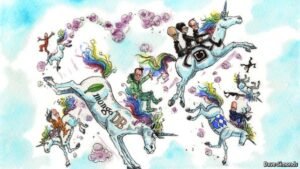
Social media died - for hours.
Talk about 'understanding the times.' Many picked the wrong time to set sail with their goods on Thursday, March 14 2019. Sh** hit the fan. All hell broke loose. Pandemonium ensued. The three largest Social Media platforms - Facebook, WhatsApp and Instagram [MarkVille] - went down for at least 8 hours. While users wondered what sort of iceberg hit their beloved vessels, many jumped ship and took to Twitter. Twitter, home of banter, the world's headquarters for the hottest gist and gossip welcomed them with open arms. FacebookDown and InstagramDown chants filled the air in the way of hashtags, and Twitter influencers had a filled day.
Home to a combined 4.8 billion users, there's no larger country anywhere in the world. Put simply, if Mark was a President and the subscribers to his SM products were citizens, he would lead a land bigger than China and India.
What was lost?
Millions of companies advertise on MarkVille. In fact, many live there predominantly. They advertise, take orders, ship, restock, run promotions entirely there. When the outage occurred, most running ads simply disappeared - or well, took on Ghost mode. They were running but weren't leaving footprints. You couldn't see them. Imagine all billboards and posters taken down all over cities, and all shops shut down. Businesses couldn't showcase their wares properly, and buyers couldn't see.
On WhatsApp, it wasn't as drastic. While you could still continue chatting with the love of your life, it was your voice notes and lovely videos that suffered. You'd have had better luck getting a stubborn cow on a boat.
What caused it?
A glitch. A server outage that's bound to happen if you run an economy so dynamic, so diverse. Amid the scramble to restore order back to their systems, MarkVille had to resort to its rival, Twitter, to explain that this was being worked on and the nightmare would soon pass.
What if it happens again - this time on a grander scale? What if not just a part, but all of social media dies for more than hours, but days, ever?
It's not a first. Not a second. And it is bound to happen again. Twitter itself is experimenting with a side product called Twttr in a bid to redesign, overhaul its product.
While liability falls like a lot all around laps for these technological glitches, how is your business preparing to meet uncertainty squarely in the field of future uncertainty?
It may seem highly unlikely - especially as the Worldwide Web hit 30 on 12 March 2019. Somehow, the internet has survived.
But what if some internet-esque electromagnetic pulse hit, and everything was shut down? Or an alien civilization struck and took out Earth's technology first?
Doomsday scenarios beg for emergency procedures.
What nasty and brutish times await?
Read some more of my writing here.
Is the [Nigerian] Legal Industry stunted in growth?
The Nigerian legal industry is not growing.
What do you do about a child who looks and acts 12, but whose birth certificate says 40? How do you manage a situation where appearance and reality are stark opposites?
Medically, although the Stunted Growth condition is global in nature, it has a disturbing widespread presence in Africa. Could Nigeria's Legal Industry be suffering so much stagnancy and stunted growth because we think too much like lawyers? Sometimes we don’t follow the science. We follow the sentiment and buzz. We flock.
Stay with me.
There are job descriptions today that didn't exist 10 years ago. For instance, you couldn't be employed as a Social Media Manager, a Data Scientist, an SEO Specialist, a Coder, a FrontEnd Developer, a BackEnd developer, Full Stack Engineer, an Uber driver, or even a Legal Tech Advisor.
But we live in a different world today than we did in 2009.
When the #10yearChallenge hit the waves of social media many weeks back, I took some time to consider just what kind of time-capsuled pictures Technology would share if it joined the Challenge as a poster. Today, your iPhone is millions of times faster than the Apollo Computer onboard Apollo [the spaceflight that enabled the first men to land on the moon]. In a new world of the blockchain technology, geocoding, geotagging and data analytics, it's only a matter of time before our Salomon vs Salomon, Labinjoh vs Abake, Diamond vs Chakrabarty memories give way for current realities.
Still, our learning models, justice systems, legislative processes, electoral patterns, work habits bear 1980 tags - back there in the days of floppy disks, turntables and car-size TVs.
The Nigerian legal industry is not growing.
Perhaps we are hyped in our minds about the future and all its prospects, yet dogmatic with our laws, practice styles, job titles and work ethics. Maybe we are scared to take a step into the river for fear that we may drown. Are we stunted in our approaches, unwelcoming of newer ideas and suggestions for fear that we may soon become irrelevant?
And that is the danger of it all.
For, how do we handle a future we're unprepared for? How do we regulate an industry that's globally moved a thousand miles while we're still circling through streets of the Past, shuffling mountains of papers, battling hours of avoidable commuting, labouring daily to choose between having a life and a career?
The stunted growth condition is a medical anomaly by which the body continues to grow old, but stops growing up. It can plague an industry and can haunt a nation. It is like being stuck in the mud of an eternal present, while time mindlessly ticks away. Like swimming around in stagnant waters while rapping incessantly about what glory the future holds.
This post first appeared here on March 28, 2019.
Read some more of my writing here.
The Rise of AI: are we in a fight for our future?
“By far the greatest danger of Artificial Intelligence is that people conclude too early that they understand it.”
― Eliezer Yudkowsky
The rise of AI and the fight for our future.
There's a new kid on the block. An elitist, hardly smiling loner we didn't really know much about until recently. A changer. A shapeshifter. A disruptor who cares little for the council of industrial 'elders' or the traditional waters of Status Quo. Unlike any character the ancients ever studied, he does what he wants, goes where he wants.
You see, from when man discovered how to make tents from bent iron, or how to make fire from cracked stones, we have come a long way. Today, there are million-dollar-a-piece drones, flying cars, self-driving bikes, gene-editing technologies, technological feats too amazing to believe.
But not all advancement is positive. As we continue to record major strides in the health sector, and we begin the countdown until Cancer is no longer a health threat, we must face our realities squarely.
Some believe that humanity's embrace of artificial intelligence is the action which eventually activates our extinction as a human race. Extremely intelligent systems trained to process exabytes of data in minutes don't have to do much to deactivate our defences, should they choose to. Some of the remarkable among the AI naysayers are the late esteemed astrophysicist Stephen Hawking and Elon Musk who have expressly cried out for the future threat AI poses.
But is there any merit to their fears?
A recent research project concluded by Google's DeepMind has revealed that as AI advances, it becomes more aggressive in its workings.
Here's what happened. DeepMind created a simple AI game called Gathering. The goal of the game was to gather apples. The AI agents were also armed with lasers to be used where necessary. With an abundance of apples, they cooperated. However, as the apples diminished, the AIs' attitude gradually changed. Subsequently, they began to attack each other.
Quite interestingly, the more advanced AIs were less interested in "bonding" and attacked others frequently, regardless of the state of the game's economy - abundance or scarcity.
What happens where there are indeed no apples to even compete for?
The more crucial question is: should the same scenario play out in real life, what will be the response of these AIs where their main competition is humans?
Is Elon Musk right after all?
Do humans have an exit plan? Should we enact laws that mandate a failsafe protocol should all the conspiracy theorists suddenly turn out right? Do we have measures in place to ensure companies comply with such protocol?
And if it is the Governments' responsibility to make laws regulating these strides, who checks the Governments as they secretly pursue their own agenda to dominate the world?
The rise of AI and the fight for our future is as crucial as any discourse we are having today about global warming and climate change.
Thoughts?
This post first appeared here on February 8, 2019.
You can also read some more of my writing here.
